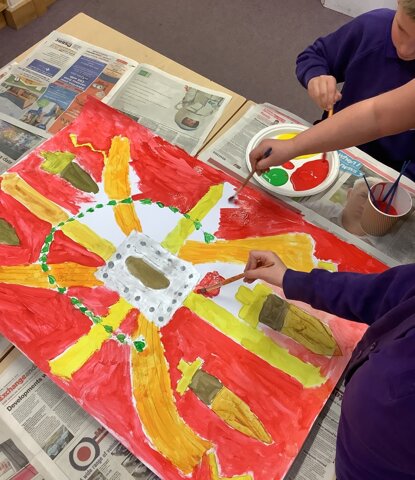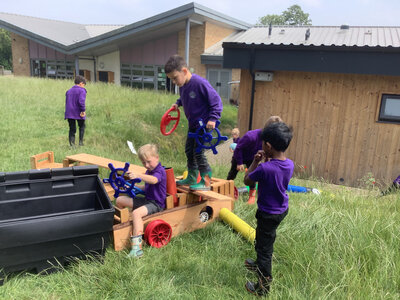Art and Design Curriculum Overview
Art intent
- Where possible, we link our Art studies to our topics.
- We aim to provide topics that encourage a progression of knowledge and skills across year groups, developing and building on previous knowledge.
- We follow the National Curriculum which lays out the knowledge and creativity that children develop through their journey at Millbrook.
- We use a progression of knowledge and skills document which enables teachers to plan to meet the range of abilities throughout their year groups and ensures that the curriculum is knowledge-focused. This ensures that all abilities are catered for – extended and supported as appropriate.
- Our Art Curriculum is mapped out so that children learn about a diverse range of artists throughout their time at Millbrook.
- The knowledge covered in each year group builds on what they covered in the previous year.
- By the time pupils leave Millbrook they will have learnt about a range of national and international artists, improved and developed their artistic skills using a range of materials and media (for example pencils, paint, pastels, charcoal and clay) and produced a sketch book evidencing their progression of skills and personal interpretation as they progress through the school.
- Art is taught as a discrete lesson each week, during the dedicated Art terms. This is planned either as a block of lessons or a complete day (or a combination of the two), in which pupils discover an Artist, learn a technique, immerse themselves in the work, produce their own interpretation and evaluate their own work. Although Art is taught discretely, we, at Millbrook, encourage children to apply their skills at opportune moments in all their learning.
- At the start of each lesson, teachers provide children opportunities to recap previous learning in order to build upon the skills already learnt.
- Each phase decides on their WOW starters and fantastic finishers, however, these are often Art infused due to the accessibility to all pupils. Across the year, we incorporate Art in various themed weeks, including Poetry Week and World Book Week.
- Pupils are given the chance to visit both local and National Art galleries.
- In Foundation Stage, children have access to Art during continuous and enhanced provision throughout the year. They can use the resources to create anything and are encouraged to talk through not only the final product but also the process of creation. Some learning themes in Foundation Stage link well with Art and in these weeks, children are explicitly taught different skills which they can use in the provision: experimenting with colour, design, texture, form and function. They also learn about different famous artists.
- We evidence our learning in our sketch books which are developed from Year 3 up to Year 6. Also, all classes have Art displayed throughout the room, as well as showing evidence throughout the school.
- Each term, children produce a final piece of work, developed from their immersion into the artist and skill learnt that term.
- Pupils are given feedback both during and at the end of each lesson, to enable them to continue developing their skills and understanding of how to apply different Art techniques and skills. Occasionally, at the end of lessons teachers will hold a ‘Walking Gallery’ enabling pupils to appreciate and evaluate their own and their peers’ work.
- Pupils enjoy Art.
- They are actively engaged during lessons, eager to apply their knowledge and skills to the activity.
- Pupils will have built up their knowledge of a range of artists and artistic techniques.
- By the time pupils leave Millbrook, they will have the confidence to be creative, they will have also built up the resilience to make mistakes.
- They will think of themselves as artists and be critical about their own and other’s work.



.jpg)